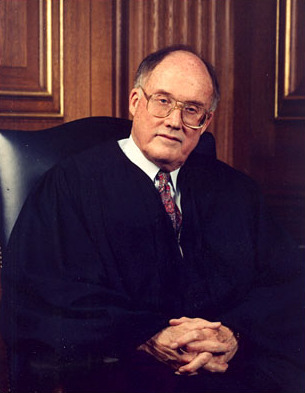The Supreme Court: How it Was, How it Is (1987).
Books, articles, and speeches
Contexto: An oft-heard description of the Supreme Court is that it is the ultimate protector in our society of the liberties of the individual. This phrase describes an important role of the Supreme Court, but by ignoring other equally important functions of the Court, it has a potential for mischief. It is a fairly short leap from this language to a feeling that the US Constitution is somehow "vindicated" every time a claim of individual right against government is upheld, and is not vindicated whenever such a claim is not upheld. But this, of course, cannot be the case. The role of the Supreme Court is to uphold those claims of individual liberty that it finds are well-founded in the Constitution, and to reject other claims against the government that it concludes are not well-founded. Its role is no more to exclusively uphold the claims of the individual than it is to exclusively uphold the claims of the government: It must hold the constitutional balance true between these claims.
William Rehnquist: Frases em inglês
Memo written to , as cited in "The Partisan" http://www.nytimes.com/1985/03/03/magazine/the-partisan.html, in the New York Times, March 3, 1985
Judicial opinions
Contexto: It is about time the Court faced the fact that the white people in the South don't like the colored people; the Constitution restrains them from effecting this dislike through state action, but it most assuredly did not appoint the Court as a sociological watchdog to rear up every time private discrimination raises its admittedly ugly head. To the extent that this decision advances the frontier of state action and 'social gain,' it pushes back the frontier of freedom of association and majority rule.
Nixon v. Administrator of General Services, 433 U.S. 425 (1977) (dissent); the court ruled 7–2 that Congress could seize Richard Nixon’s presidential papers.
Judicial opinions
The Supreme Court: How it Was, How it Is (1987).
Books, articles, and speeches
Contexto: An oft-heard description of the Supreme Court is that it is the ultimate protector in our society of the liberties of the individual. This phrase describes an important role of the Supreme Court, but by ignoring other equally important functions of the Court, it has a potential for mischief. It is a fairly short leap from this language to a feeling that the US Constitution is somehow "vindicated" every time a claim of individual right against government is upheld, and is not vindicated whenever such a claim is not upheld. But this, of course, cannot be the case. The role of the Supreme Court is to uphold those claims of individual liberty that it finds are well-founded in the Constitution, and to reject other claims against the government that it concludes are not well-founded. Its role is no more to exclusively uphold the claims of the individual than it is to exclusively uphold the claims of the government: It must hold the constitutional balance true between these claims.
Address http://www.supremecourtus.gov/publicinfo/speeches/sp_04-09-01.html at a Swedish Colonial Society luncheon in Philadelphia (9 April 2001).
Books, articles, and speeches
Goldman v. Weinberger, 475 U.S. 503 (1986) (majority opinion); the ruling upheld the military's prohibition of a Jewish officer from wearing a yarmulke indoors while in uniform.
Judicial opinions
Written statement reacting to speculation that he might retire from the US Supreme Court after Sandra Day O'Connor declared that she would. (July 2005).
Books, articles, and speeches
Address at Suffolk University Law School; quoted in The New York Times (17 April 1986).
Books, articles, and speeches
Booknotes http://www.booknotes.org/Transcript/index_print.asp?ProgramID=1107 television interview (July 5, 1992)
Booknotes http://www.booknotes.org/Transcript/index_print.asp?ProgramID=1107 television interview (July 5, 1992)
Letter to the Phoenix, Arizona city council, as cited in The Rehnquist Court : Bill Rehnquist Was Once Considered An Extremist. Now His Views Almost Always Become The Law Of The Land. http://articles.latimes.com/1991-09-29/magazine/tm-4832_1_rehnquist-court/4, by David G. Savage, in the LA Times, September 29 1991
Quoted in Time magazine (13 June 1988).
Books, articles, and speeches
United States v. American Library Association, 539 U.S. 194 (2003) (plurality opinion); the case concerned whether Congress could require libraries receiving Federal subsidies for Internet connectivity to install filtering software.
Judicial opinions
Address at a Swedish Colonial Society luncheon in Philadelphia (9 April 2001).
Books, articles, and speeches
Wallace v. Jaffree, 472 U.S. 38 (1985) ( dissenting opinion http://straylight.law.cornell.edu/supct/html/historics/USSC_CR_0472_0038_ZD2.html).
Judicial opinions
Address at a Swedish Colonial Society luncheon in Philadelphia (9 April 2001).
Books, articles, and speeches
As quoted in The Rehnquist Choice: The Untold Story of the Nixon Appointment That Redefined the Supreme Court (2001) by John Dean; quoted in an article http://slate.msn.com/id/117140/ at Slate.
Books, articles, and speeches
Booknotes http://www.booknotes.org/Transcript/index_print.asp?ProgramID=1107 television interview (July 5, 1992)
Booknotes http://www.booknotes.org/Transcript/index_print.asp?ProgramID=1107 television interview (July 5, 1992)
Rostker v. Goldberg, 453 U.S. 57 at 80 (1981) (majority opinion); this ruling upheld a military draft for males only.
Judicial opinions
Address at the University of Minnesota Law School; quoted in The New York Times (20 October 1984).
Books, articles, and speeches
On writing.
Booknotes http://www.booknotes.org/Transcript/index_print.asp?ProgramID=1107 television interview (July 5, 1992)
Batson v. Kentucky, 476 U.S. 79 (1986) (dissenting opinion).
Judicial opinions
General Electric Co. v. Gilbert, 429 U.S. 125 (1976) (majority opinion); the ruling allowed GE's employee disability insurance plan to exclude conditions arising from pregnancy.
Judicial opinions
As quoted in BBC article http://news.bbc.co.uk/1/hi/world/americas/4212570.stm on his death. (4 September 2005).
Books, articles, and speeches
Statement before the National Commission on Public Service http://www.uscourts.gov/Press_Releases/cj.html, July 15, 2002.
Books, articles, and speeches
ibid.
Books, articles, and speeches
